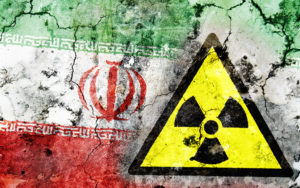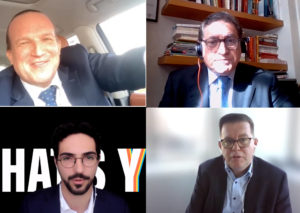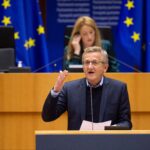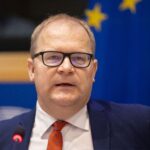What role should the EU play in the Middle East and the Iran negotiations?
“Not business as usual? Europe, Iran and the Gulf” was the subject of the second panel discussion that EU Watch organised as part of Strategic Intelligentia‘s Gulf Futures Form held in March 2022.
The three panelists – Dr. Raphael Nagel, Dr. Majid Golpour and Nathanaël Chouraqui – discussed the on-going negotiations in Vienna over Iran’s nuclear programme, the Abraham Accords between Israel and two Gulf states, and the role of the European Union in these latest developments.
The panel was moderated by EU Watch’s Executive Director, Michael Thaidigsmann. Below, you can read the main points that were made – you can watch the full video of the breakout session as well as many other expert talks on this and similar subjects at gff.vfairs.com (registration is free).
Michael Thaidigsmann: Raphael Nagel, you were the cofounder of the Abrahamic Business Circle. What was your motivation for this initiative?
Raphael Nagel: The Abrahamic Business Circle promotes business globally, helping companies to find distribution and partners.
Michael Thaidigsmann: When the Abraham Accords were signed, the EU was not a part of it. Is Europe reluctant to engage in the Gulf?
Raphael Nagel: The Abraham Accords are not a peace agreement because there was no war to begin with. I think of them as normalisation agreements. They are in the interest of Israel and the United Arab Emirates. Europe was not involved because, at the time, diplomacy was brought by the Americans. Although Europe is very present in the Middle East it is not in these accords. Trump understood Dubai quite well because he had business there and was quite interested in the region whereas the EU has had no decision-maker concentrating on this subject. But the EU has always kept strong ties and trade relations. In the last few years, we have had a trade volume of 1.5 billion per year with the potential to grow to 5 billion per year.
“Europe can learn tolerance, respect and open-mindedness from the United Arab Emirates” – Raphael Nagel
Michael Thaidigsmann: Will that mean a more peaceful Middle East, or do you see potential new conflicts?
Raphael Nagel: The Abrahamic Business Circle is not political, but we have events coming up with diplomats from the Europe and the Middle East. I think any type of relation that can flourish can bring peace and prosperity. In Dubai, we are able to make business with everybody, regardless of their country. For example, flights to and from Israel are multiplying now. Trade with Europe is currently very high, but the question is, how competitive is Europe? In Dubai, salaries are very competitive.
Europe will always be competitive because of innovation. But, currently, Europe seems to be very busy with itself. The UAE is mostly made of immigrants, 90 percent of people here are guest workers. This is a huge number, and Europe should learn from it. Here, you are not judged by your origin or the colour of your skin but by what you bring to the table, what you can deliver. Europe can learn tolerance, respect and open-mindedness.
Michael Thaidigsmann: What could the Gulf do in the economic sense to alleviate the burden of the war between Ukraine and Russia?
Raphael Nagel: Saudi Arabia and the UAE are neutral for the moment. Here, we see people from Russia and Ukraine still sharing the same table. The UAE will probably try to help, provide and intermediate as much as they can. Political leaders will have to decide on a way out of this situation.
Michael Thaidigsmann: Majid Golpour, the JCPOA negotiations and talks with Iran have been going on for 20 years now. What are the big issues currently being discussed and where do we stand on this potential agreement?

Graphic: Shutterstock
Majid Golpour: With Europeans, multilateral diplomacy started by being successful. They could understand and discuss with their Iranian counterparts. The 2015 agreement, the JCPOA, resulted from these discussions. But the strategic agreement has been in the hands of the Supreme Guide, Ayatollah Khamenei. Consequently, Trump withdrew from the deal, despite the JCPOA having an internal mechanism for dispute settlement. Trump could have negotiated but, unfortunately, it was a troubled time. Now, three years on, Iran did not accept to have direct talks with the US. The EU negotiator Enrique Mora lost his position as the main negotiator and Mikhail Ulyanov, ambassador of Russia, took advantage of the calendar of negotiations.
There is currently a lot of trouble with Russia because they have asked for guarantees against sanctions. Plus, China and Russia have a sort of “hidden deal” between themselves. The balance of power is important and any deal depends on Putin. The text has been ready for some time and yet, the negotiations have been going on for eleven months now. But the problem is not so much the text, it is more the balance of power. We see now how important it is for Europe to assume the leadership in these negotiations and to not allow Lavrov and Ulyanov to lead them.
Michael Thaidigsmann: If the EU should have been be stronger in these negotiations, what exactly should Mora have done?
Majid Golpour: There are different phases in each negotiation. The first is to make clear which points are going to be negotiated. Mora needed to fix the agenda. But the agenda was, from the first day, in the hands of [Iran’s chief negotiator] Ali Bagheri Kani and of Ulyanov. They decided to only speak about lifting sanctions. Mora completely surrendered on this subject.
The second item was to put a calendar to the decision-makers. Mora was very exhaustive and open to the different areas of negotiations which made us lose a lot of time (for example, there were nine rounds of negotiations for one single item). We were supposed to have a signature last weekend but with Russia’s demand for a guarantee, that was postponed. Mora even announced that there wouldn’t be a meeting at expert level anymore. For him, the work is done.
Michael Thaidigsmann: What is keeping Russia from signing the accords if they led these negotiations?
Majid Golpour: There are three levels of bargaining. First, in the Middle East, Russia has a luxurious position with petrol producers. They want to interfere in the US negotiations with Venezuela. The strategy is to remodel the distribution of oil from the Middle East and then see how much disorder they can create for the International order. And Iran is a very nice partner when it comes to creating disorder in Yemen, Syria, Lebanon, Iraq. Second, Iran and Russia have strong ties. Russia uses mercenaries from the Middle East in Ukraine. Third, there are talks with the US, and Biden has agreed to pay a high price for the return to the JCPOA.
Michael Thaidigsmann: What would lifting sanctions do?
Majid Golpour: This second JCPOA is very chaotic. There are four principal categories of sanctions: they concern human rights, terrorism, funding of terrorism and the administration of sanctions between the US and the EU. For the US, the nuclear aspect is the most important, followed by the question of proxy wars and last by human rights aspects. Plus, Iran’s demand to lift all sanctions was supported by China.
Michael Thaidigsmann: If there is no deal, what would be the alternative scenario?
Majid Golpour: For Europe, a task force is working on this subject right now, but they have not found any solution yet. But the absence of a second JCPOA would be a disaster for Europe as it is the main way to have legitimate trade with Iran. Israel has a potential Plan B, including military action.
Michael Thaidigsmann: What should the EU do to take a grip on the negotiations? How far can it go?
Majid Golpour: Europe needs a multi-head strategy because there is no one-way solution for this crisis. For each challenge (nuclear, inflation, security, economy, culture) the EU must provide an alternative, coordinated between the Council, European Parliament and the Commission. Whatever relates to civil society, cultural and human rights activity should be left up to the Parliament. In terms of security, European Council President Charles Michel has a lot of connections and I believe he is proposing an adapted strategy balancing hard and soft power. In other words, he uses diplomacy but also pressure.
The negotiations in Vienna over a possible new deal with #Iran are stalling. What will the EU do now? https://t.co/5q9hg2fLfC
— EU Watch (@EUWatchBrussels) March 11, 2022
A partnership could be done with the neighbourhood of Iran, regarding a free trade zone having a direct relation of Europe to the International Bank for investments. An initiative for an “economic purge” should be adopted to fight unhealthy economy in the region and the funding of terrorism. China and Russia are getting more powerful in the area, and it is up to the EU to decide the tempo.
Michael Thaidigsmann: Is it possible to do trade in Iran with companies that are not linked to the regime?
Majid Golpour: At the economic level, it is possible. The big change must come from the economic area. If we restructure the economic model, this could bring a new perspective for Iran and for the region’s new generation. There won’t be big opposition, not even from the Iranian government. We would need a free trade zone and let all these countries understand they share the same interest.
“Europe needs a multi-head strategy because there is no one-way solution for this crisis” – Majid Golpour
Michael Thaidigsmann: Nathanael Chouraqui, is the EU capable of delivering such a free trade zone? Is it projecting power, or does it need an army to do so?
Nathanael Chouraqui: Before applying any military power, the 27 member states need to come to a consensus. However, a number of Middle Eastern questions, there is no such consensus. For example over Libya. There is this myth that no one can do anything in the Middle East without boots on the ground. That is true in certain cases, like Syria or Iraq. But in Lebanon, Yemen and Syria today, the EU has the capacity to have an impact through soft power, through sheer economic and diplomatic power. It is just a matter of realising that and of being focused enough to apply it. With the Russian crisis,the EU has realised that they have power. If they act together in a coordinated way, it can have an effect.
Michael Thaidigsmann: Can you imagine in the next few years applying the same sanctions in the Middle-East, for example in Iran?

Raphael Nagel, Majid Golpour, Nathanaël Chouraqui, Michael Thaidigsmann
Nathanael Chouraqui: There is a realisation of the EU’s power. But it is too early to say if there is going to be a before and an after. First, because the Ukraine crisis is happening on the European continent, which is a more direct threat to European values, security and peace. That incentive might not be replicable in other theatre of operations. But European leaders are realising their power. Whether they will want to apply this elsewhere is a different question. We don’t even know if it is going to last against Russia. Right now, there is a shock moment in the EU. But what if it continues for six months? Will Germany start to fragilize this unity because of their need for energy from Russia? Will Italians start diplomatic issues? This united front is very circumstantial.
Michael Thaidigsmann: When Trump was in power, there was no unity of the West. Do you think that led to the kind of agreement in Vienna where Russians and China take over power instead? Should the US and the EU work hand in hand, or do they have too different of interests?
Nathanael Chouraqui: When it comes to the balance of power between Russia and the West, there is a definite front to be showed. But more broadly, concerning the dogma of the EU aligning with the US, I don’t think it is desirable, effective or even possible. Iran is a very hard policy player to read. There are hardliners, reformists, progressists, moderates. There are national, economical and religious interests. All of this is hard to read at any given time. An international negotiation framework with the US and the EU adopt different strategies helped the West to deal with the different aspects of Iranian foreign policy and speak to different actors within Iranian society and government. Having a go-between position between the US and Iran has been useful at times for Europe. Oman and Switzerland had this role in the past.
Michael Thaidigsmann: What role do you see for the Gulf countries in these discussions?
Nathanael Chouraqui: The Emirates and Bahrain want to have a role. They made repeated calls to the US to be included in the deal. But only Qatar was successful to an extent. It is a frustration for them to be rejected, but they have their own agenda. Was Biden right to exclude them? It would have taken way more time to include other countries. Joe Biden probably had in mind that it would make an agreement more difficult, longer and maybe even impossible.
Michael Thaidigsmann: You created the media platform That’s Y. Information is very relevant in conflicts in Ukraine and in the Middle East. What is the place of correct information? What can we do to improve information of players to ensure correct decision making.
Senior western source concurs that what exactly Russia's stance is now on #IranTalks sanctions guarantees "is not clear." Awaiting official communication.
— laurence norman (@laurnorman) March 15, 2022
Nathanael Chouraqui: That’s Y is a platform we launched in 2021 during the Afghan crisis. It is about empowering the audience on the issue they learn about. Not only about talking about a subject but also how you can be an actor. Objectivity and neutrality is the goal but obviously can’t be achieved. Nowadays concerning the Middle East, it is more about staying away from sheer propaganda divisiveness. There are a lot of state-sponsored digital media furthering their agenda. It is very dangerous. We are an independent media that put bridges and puts an emphasis on the people on the ground rather than governments.
“The united front of the EU is very circumstantial” – Nathanael Chouraqui
Michael Thaidigsmann: Do we have enough information on what is happening inside Iran? Is Europe well informed?
Majid Golpour: Europe is very well informed about the situation in Iran. Foreign ministers are in a permanent exchange of information with Tehran. The current Iranian narrative is pushing for hegemony in the region. In Europe, there is an important lobby of Iran, representing a very specific ultra-radical orthodox ideology. The issue is that each section in Europe is doing its work but not coordinated. We need someone to take charge of the dossier in close cooperation with the International Atomic Energy Agency. The breakout moment for Iran to get the bomb is fast approaching.
Michael Thaidigsmann: Could a deal delay the nuclear bomb?
Majid Golpour: Most countries accept that we are facing a nuclear Iran anyway. It is a problem for safety. If Rafael Grossi and Antony Blinken sign the agreement, they have the possibility of postponing this breakout moment.
Nathanael Chouraqui: I think it depends on the deal we get. This current draft is too close to the first agreement and it does not take into account the scientific progress that has been made. The other route is nuclear proliferation, so if we have a chance for a strong deal, let’s take it.
Speakers
Dr. Raphael Nagel – International businessman and philanthropist; founder of the Abrahamic Business Circle, United Arab Emirates
Dr. Majid Golpour – Sociologist, international relations expert and EU consultant, France/Belgium
Nathanaël Chouraqui – Journalist and founder of the digital media “That’s Y”, France
Moderator: Michael Thaidigsmann – Journalist and Executive Director, EU Watch, Belgium






